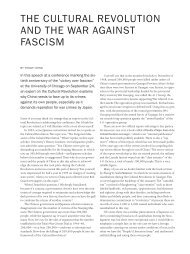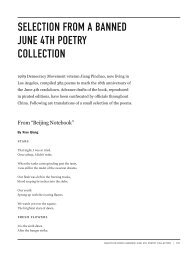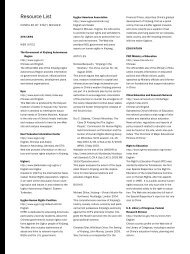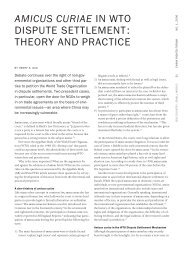- Page 1 and 2: STATE SECRETS: CHINA’S LEGAL LABY
- Page 3 and 4: Table of Contents Acknowledgments v
- Page 5: 4. Regulation on State Secrets and
- Page 8 and 9: Abbreviations CAT Convention Agains
- Page 11 and 12: Introduction Since the People’s R
- Page 13 and 14: These are all examples of how the P
- Page 15: A. The International and Domestic L
- Page 19 and 20: 2. THE PRC STATE SECRETS FRAMEWORK
- Page 21 and 22: Some specificity is delineated unde
- Page 23 and 24: How information is treated once it
- Page 25 and 26: Neibu Information and “Work Secre
- Page 27 and 28: 3. ENFORCEMENT OF THE STATE SECRETS
- Page 29 and 30: Furthermore, forbidden information
- Page 31 and 32: In the State Secrets Law, individua
- Page 33 and 34: 4. DEROGATIONS FROM PROCEDURAL PROT
- Page 35 and 36: 1. IMPACT ON THE RULE OF LAW The st
- Page 37 and 38: Examples of how individuals’ righ
- Page 39 and 40: Investigation stage: In conducting
- Page 41 and 42: Intimidation of and Attacks on Defe
- Page 43 and 44: AIDS activist Wan Yanhai spent a mo
- Page 45 and 46: Public health outbreaks: Many facto
- Page 47 and 48: Corruption and Official Malfeasance
- Page 49 and 50: Torture in prisons and detention fa
- Page 51 and 52: In his first mission to the PRC in
- Page 53 and 54: While there is an international mov
- Page 55 and 56: Whistleblowers: By attempting to ma
- Page 57 and 58: C. Reform Efforts Calls for greater
- Page 59 and 60: Similarly, on November 30, 2006 the
- Page 61 and 62: While the new national OGI regulati
- Page 63 and 64: 4. REFORMS OF THE STATE SECRETS SYS
- Page 65 and 66: In addition, the release of natural
- Page 67 and 68:
6. CONCLUSION Despite repeated offi
- Page 69 and 70:
RECOMMENDATIONS FOR THE PRC GOVERNM
- Page 71 and 72:
Introduction and Section I Notes 1.
- Page 73 and 74:
13. U.N. Commission on Human Rights
- Page 75 and 76:
Time Limits of State Secrets (国
- Page 77 and 78:
imprisonment of not more than five
- Page 79 and 80:
104. “The Liaoyang Four Have Been
- Page 81 and 82:
129. “Harassment Continues After
- Page 83 and 84:
153. Edward Cody, “China Puts Jou
- Page 85 and 86:
182. Information Office of the Stat
- Page 87:
213. “Regulation on Disclosure of
- Page 90 and 91:
80 HUMAN RIGHTS IN CHINA STATE SECR
- Page 92 and 93:
Purpose Definition of state secrets
- Page 94 and 95:
Scope of state secrets 第二章
- Page 96 and 97:
Marking classified materials Determ
- Page 98 and 99:
Security measures for classified do
- Page 100 and 101:
Forbidden military zones and places
- Page 102 and 103:
Criminal liability Administrative s
- Page 104 and 105:
2. MEASURES FOR IMPLEMENTING THE LA
- Page 106 and 107:
Consequences of disclosure and clas
- Page 108 and 109:
Amendment of classification Determi
- Page 110 and 111:
Reporting by state secrets bureaus
- Page 112 and 113:
Written record Notification of chan
- Page 114 and 115:
Measures for meetings location part
- Page 116 and 117:
Rewards 第四章 奖 惩 第二十
- Page 118 and 119:
Severe administrative sanctions if
- Page 120 and 121:
No application to other secret matt
- Page 122 and 123:
3. THE SUPREME PEOPLE’S COURT 112
- Page 124 and 125:
Intelligence to bodies/organization
- Page 126 and 127:
"Knows/should know" standard for pr
- Page 128 and 129:
Definition of "any act of endangeri
- Page 130 and 131:
Search by state security organ and
- Page 132 and 133:
Violations by state personnel Viola
- Page 134 and 135:
十四岁以上不满十六岁未
- Page 136 and 137:
Promulgating authority Scope of eac
- Page 138 and 139:
7. 公安机关调查掌握境内
- Page 140 and 141:
3. 反革命案件的统计数字
- Page 142 and 143:
Secret 15. 公安机关隐蔽工作
- Page 144 and 145:
11. 公安机关社会化、职业
- Page 146 and 147:
Public security work and other depa
- Page 148 and 149:
2. REGULATION ON STATE SECRETS AND
- Page 150 and 151:
Highly secret 2. 全国死刑统计
- Page 152 and 153:
Effective date 第六条 本规定
- Page 154 and 155:
Purpose and promulgating authority
- Page 156 and 157:
Highly secret Cases of high signifi
- Page 158 and 159:
Secret Cases of relatively high sig
- Page 160 and 161:
Matters regarding newly-created or
- Page 162 and 163:
4. REGULATION ON STATE SECRETS AND
- Page 164 and 165:
2. 预防和处置监狱、劳教
- Page 166 and 167:
Judicial administration work and ot
- Page 168 and 169:
11. 在一定时间和范围内的
- Page 170 and 171:
D. Regulation on the Protection of
- Page 172 and 173:
System to check on protection of st
- Page 174 and 175:
Covering meetings/other activities
- Page 176 and 177:
Illegal reporting/publishing of sta
- Page 178 and 179:
E. Selection of State Secrets Provi
- Page 180 and 181:
NAME OF REGULATION ISSUING BODIES A
- Page 182 and 183:
NAME OF REGULATION ISSUING BODIES A
- Page 184 and 185:
NAME OF REGULATION ISSUING BODIES A
- Page 186 and 187:
NAME OF REGULATION ISSUING BODIES A
- Page 188 and 189:
NAME OF REGULATION ISSUING BODIES A
- Page 190 and 191:
NAME OF REGULATION ISSUING BODIES A
- Page 192 and 193:
NAME OF REGULATION ISSUING BODIES A
- Page 194 and 195:
NAME OF REGULATION ISSUING BODIES A
- Page 197 and 198:
Table of Contents Editors’ Introd
- Page 199 and 200:
DOCUMENT 1 Jiang Zemin: The Work of
- Page 201 and 202:
改革,扩大开放,越要做好保
- Page 204:
DOCUMENT 3 The “Basic” and “S
- Page 208 and 209:
DOCUMENT 5 The Determination and Ha
- Page 210 and 211:
DOCUMENT 6 Assessing State Secrets
- Page 212 and 213:
GRADING STANDARDS FOR INSPECTING AN
- Page 214 and 215:
CHAPTER 15: THE PROTECTION OF STATE
- Page 216 and 217:
fied way with the central authoriti
- Page 218 and 219:
ence the development of bilateral o
- Page 220 and 221:
should be sent to a higher-level de
- Page 222 and 223:
1. The host unit must appoint a spe
- Page 224 and 225:
A. INDIVIDUALS CHARGED WITH STATE S
- Page 226 and 227:
A. INDIVIDUALS CHARGED WITH STATE S
- Page 228 and 229:
A. INDIVIDUALS CHARGED WITH STATE S
- Page 230 and 231:
A. INDIVIDUALS CHARGED WITH STATE S
- Page 232 and 233:
A. INDIVIDUALS CHARGED WITH STATE S
- Page 234 and 235:
A. INDIVIDUALS CHARGED WITH STATE S
- Page 236 and 237:
A. INDIVIDUALS CHARGED WITH STATE S
- Page 238 and 239:
A. INDIVIDUALS CHARGED WITH STATE S
- Page 240 and 241:
B. INDIVIDUALS LIKELY DENIED PROCED
- Page 242 and 243:
B. INDIVIDUALS LIKELY DENIED PROCED
- Page 244 and 245:
B. INDIVIDUALS LIKELY DENIED PROCED
- Page 246 and 247:
APPENDIXIII Incidents of Official C
- Page 248 and 249:
INCIDENTS OF OFFICIAL COVER-UPS, co
- Page 250 and 251:
INCIDENTS OF OFFICIAL COVER-UPS, co
- Page 252 and 253:
INCIDENTS OF OFFICIAL COVER-UPS, co
- Page 254 and 255:
17. In response to this protest, on
- Page 256 and 257:
246 HUMAN RIGHTS IN CHINA STATE SEC
- Page 258 and 259:
248 HUMAN RIGHTS IN CHINA STATE SEC
- Page 260 and 261:
CHINESE PINYIN ENGLISH 情报 qingb
- Page 262 and 263:
252 HUMAN RIGHTS IN CHINA STATE SEC
- Page 265 and 266:
I. CHINESE LANGUAGE SOURCES “百
- Page 267 and 268:
“官员多为仕途「造数」.
- Page 269 and 270:
湖南省长沙市中级人民法
- Page 271 and 272:
“罗干强调进一步做好新
- Page 273 and 274:
“突发事件应对法已送人
- Page 275 and 276:
“政府信息公开条例起草
- Page 277 and 278:
II. ENGLISH LANGUAGE SOURCES The 6t
- Page 279 and 280:
“China: Death Sentence of Tenzin
- Page 281 and 282:
Ford, Peter. “Ahead of Olympics,
- Page 283 and 284:
Keller, Perry. “Privilege and Pun
- Page 285 and 286:
Oksenberg, Michel. “Methods of Co
- Page 287 and 288:
———. “Report of the Working
- Page 289:
———. “Virus Hunters,” Glo
- Page 292:
STATE SECRETS: CHINA’S LEGAL LABY







